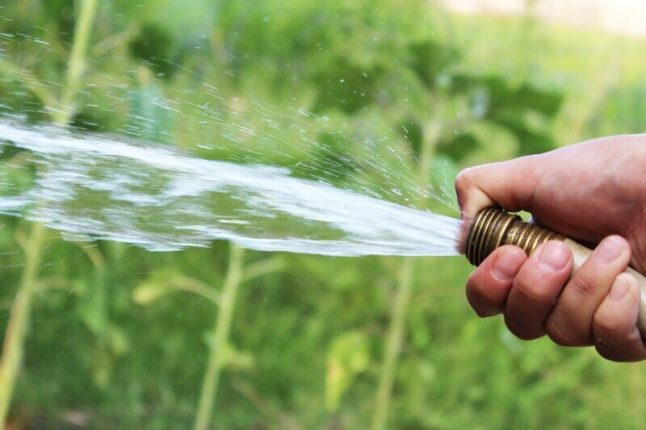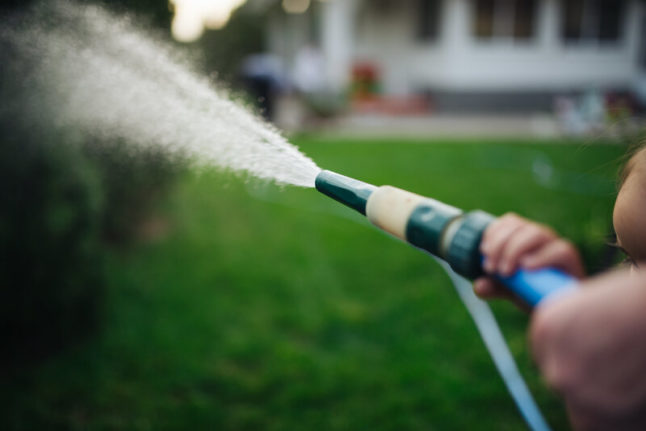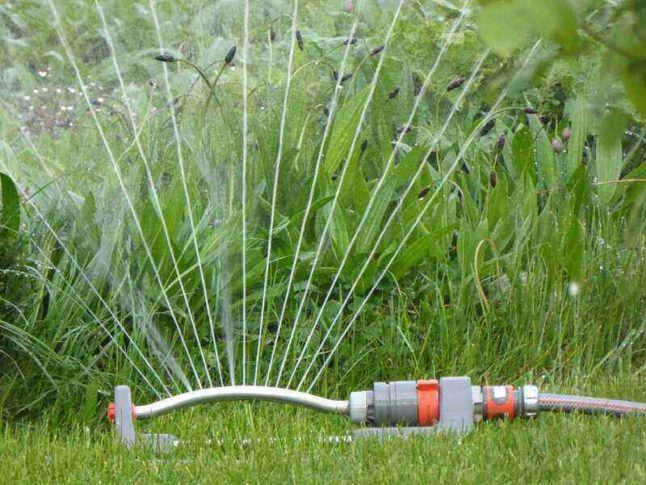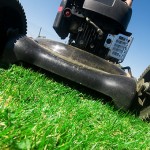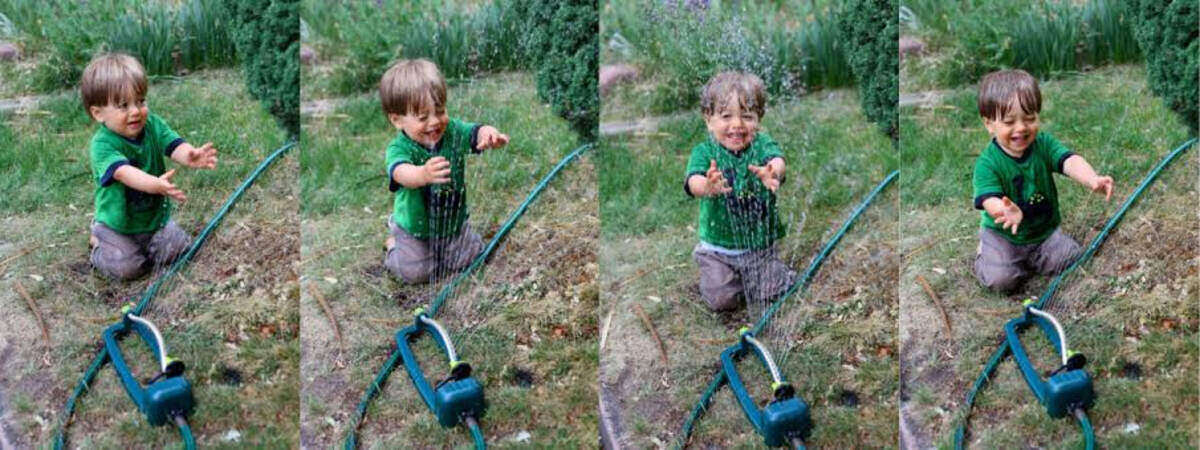
During summer, lawn watering and irrigation systems are the chief sources of water usage. Watering times generally double during this time of the year, creating strict water restrictions across Colorado, especially in Denver. With those restrictions in mind, here are four essential lawn watering tips for Denver, CO.
Watering Rules and Restrictions
From May 1 to Oct. 1, Denver residents must follow these rules:
- No watering between 10 a.m. and 6 p.m.
- No watering during rain or strong winds.
- Leaky sprinklers must be fixed within ten days.
- Don’t water more than three days per week.
- Don’t allow water to pool in gutters, alleys, or streets.
- Don’t let the water spray on asphalt or concrete.
- Use a hose nozzle with a shut-off valve to wash cars, etc.
Be careful if you plan on breaking these rules because Denver Water employs a group called Water Savers to assist in enforcing the rules and educating the public about using less water and the best water conservation practices.
4 Essential Lawn Watering Tips for Denver
Despite Denver’s rules and regulations, there are ways to maximize your lawn watering and lawn care that are both beneficial to your lawn and your wallet.
Watering your lawn can be broken down into two primary goals:
- First, you want to water adequately enough to moisten the root zone without wasting water. The root zone consists of the soil surrounding the roots (about 6 inches down).
- Second, allow the soil time to dry out between watering so that roots have the opportunity to absorb oxygen.
1. When to Water
Early in the morning, between the hours of 4 a.m. to 10 a.m., is the best time of day to water your lawn. Temperatures are the coolest, and the water won’t instantly evaporate during the heat of the day or rest on the blades too long at night, causing all sorts of fungal diseases.
So, how do you know when it’s time to water? The best time to water grass in Colorado is either when the grass turns gray-green, or footprints remain on the lawn for an extended period of time after walking on it.
2. How Much to Water
This will largely depend on the type of soil and grass root system in your lawn. However, the general rule is to give your lawn at least 1 inch of water per week.
How much to water also varies by season. Here are specifics for certain times of the year:
- May — 1.2 inches per week
- June — 1.5 inches per week
- July — 1.5 inches per week
- Aug. — 1.2 inches per week
- Sept. — 1 inch per week
- Oct. — 0.67 inch per week
When it comes to soil types, clay soils absorb water very slowly, and watering too much at once will create runoff and wastewater. Sandy soils aren’t much better since they drain water quickly and will need more frequent watering. Most lawns in Denver have clay soils.
The cycle and soak technique is one of the best watering methods for Denver’s heavy, clay soils. You can do this by altering the time increments on your home irrigation system to increase the number of start times and reduce run times.
For example, instead of watering for 16 minutes at one time, water for 8 minutes, then switch to a different zone, and then repeat until each zone has gotten the right amount of water. Watering in increments allows the soil time to absorb the water and get it to the roots of the grass to create a healthier lawn.
3. How to Avoid Water Runoff
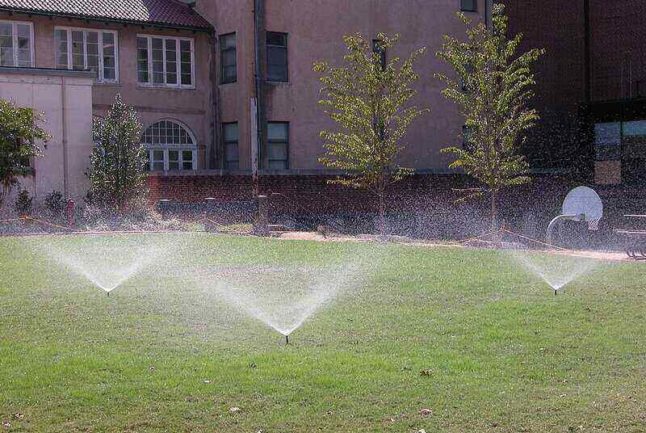
There could be an entire book written about all of the ways to combat water waste and runoff. But we’ll try to condense the novel into a few useful points.
- Know that your problem areas (i.e., slopes, areas with afternoon sun, areas near sidewalks, and under trees) will need MUCH more water and help than other areas.
- Allow your Denver grass to grow longer, and do not cut it short during the hotter months. Avoid mowing more than one-third of the grass blade at a time.
- Aerate your lawn and add a thin layer of compost (called topdressing) to improve Denver’s compacted, clay soils.
- Note that shady spots, low spots, and areas that get runoff from your neighbors won’t need as much water. Knowing those areas will allow you to adjust your sprinkler system accordingly.
- Calibrate your sprinkler system to run long enough to water each zone at least an inch. Also, allow sprinkler zones to overlap a bit to ensure adequate watering.
- You can use cans of tuna (about an inch deep) to measure how long it takes each zone to water a full inch. Track the times for each zone and set the timer to run that long for each zone.
- How often do you need to water grass in Colorado? It’s a good idea to space your watering to twice a week (once every three to four days). Apply a half-inch of water each time.
4. How to Check Your Watering
Using a shovel, dig out a small piece of sod in each zone in the lawn approximately six inches deep, and check the soil moisture. If it’s moist 6 inches deep, congrats! Your yard is getting proper watering. If not, you may want to up the ante and check your water use again next time.
FAQ About Watering Your Denver Lawn
How Long Should You Water Your Denver Lawn?
Generally, lawns in Denver require about an inch of water per week. Water your Denver lawn two to three times weekly, or once every three to four days. Watch for when your grass turns gray-green or footprints are left on the lawn for extended periods of time after walking on it. These are signs that your grass might need an extra boost of irrigation.
There are a few factors that determine how long you should run your sprinkles to get the right amount of water, such as the type of spray head and month.
Watering Three Days per Week: Minutes per Zone
| Watering Months | Fixed Spray Heads | Manual Sprinklers |
| May & September | 11-12 | 17-18 |
| June | 17 | 26 |
| July | 18 | 27 |
| August | 14 | 20 |
| Watering Months | Rotor Heads | Rotary/High-Efficiency Nozzles |
| May & September | 23-24 | 28-30 |
| June | 35 | 43 |
| July | 36 | 45 |
| August | 27 | 34 |
How Do You Make Your Lawn More Water Efficient?
The best and easiest way to make your lawn more water efficient is to regulate your lawn watering and not over-water. On average, over 50% of a household’s water usage goes towards outdoor watering. You can regulate the water you use in a few, more efficient, ways:
- Adjust your watering times around rainfall (rain sensors help with this).
- Make sure your irrigation clock is set only to the amount of water each zone needs. Don’t overwater.
- Check for system leaks to avoid wasting water.
- Consider installing soaker hoses, drip irrigation, or subsurface piping for shrubs and flower beds.
- Fine-tune and audit your irrigation system and its performance.
When Should I Stop Watering my Grass in Denver?
Lawn watering is not allowed in Denver from 10 a.m. to 6 p.m., but seasonal watering of the lawn should continue into October. Turf will continue to grow in the fall, and while you may not need to break out the mower, there is still a need for regular watering. (Colorado lawns need around 0.5 to 1 inch of water weekly in September and October.)
Why water your Denver lawn in the fall? The extra watering in the fall will help the turf to heal from the stresses of summer. Watering at this time will also help to discourage the impending winter mites.
Water Like a Pro
Achieving that perfect green picket fence yard isn’t always as easy as watering your lawn at a specific time. For lawn care tips and help to figure out your soil and grass type, and how much you need to be watering regularly, find a Denver lawn care professional near you.
Let one of our lawn care pros worry about the rules and regulations of the watering schedule while you get back to enjoying the lawn.
